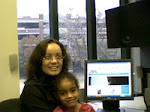I would like to highlight a few important items from the Family Health and Literacy guide written by Julie McKinney and Sabrina Kurtz-Rossi. This is important as you think about how to promote health literacy as a teacher or tutor with your learners. On page 8, the authors state your role as a teacher (tutor) is "to promote:
- Language and vocabulary skills to communicate effectively with health care providers.
- Students' confidence in their communication skills so they can advocate effectively for their family's health care needs.
- Methods of finding needed information, and critical thinking skills to evaluate the information they find. "
What is just as important is what is not your role. This is also shared on pages 8 and 9. "You don't have to be a counselor. You don't have to be a judge. You don't have to be a health expert."
Think about your appropriate role with your learners.
-Hazel


